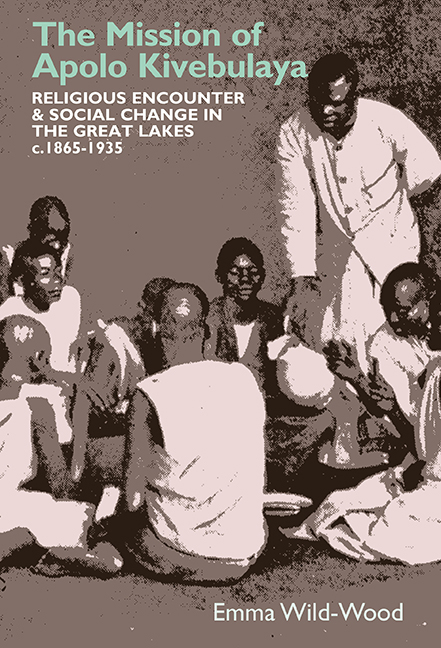Book contents
- Frontmatter
- Dedication
- Contents
- List of Maps and Photographs
- Acknowledgements
- Note on Orthography and Glossary
- Timeline
- Introduction: Kivebulaya and religious change in the Great Lakes
- 1 The afterlife of Saint Canon Apolo (1933 onwards)
- 2 Waswa, a commoner in the Kingdom of Buganda (c.1865–c.1884)
- 3 Munubi, a foot soldier in battle and evangelism (c.1884–1895)
- 4 Itinerant teacher ‘from Europe’ in Toro (1895–1905)
- 5 Clerk in holy orders (1905–1915)
- 6 To all Ituri nations under Belgian rule (1915–1925)
- 7 Reverend Canon Apolo, elder and churchman (1925–1933)
- Conclusion: African missionaries, religious encounter and social change 270
- Sources
- Index
- EASTERN AFRICAN STUDIES
7 - Reverend Canon Apolo, elder and churchman (1925–1933)
Published online by Cambridge University Press: 30 April 2020
- Frontmatter
- Dedication
- Contents
- List of Maps and Photographs
- Acknowledgements
- Note on Orthography and Glossary
- Timeline
- Introduction: Kivebulaya and religious change in the Great Lakes
- 1 The afterlife of Saint Canon Apolo (1933 onwards)
- 2 Waswa, a commoner in the Kingdom of Buganda (c.1865–c.1884)
- 3 Munubi, a foot soldier in battle and evangelism (c.1884–1895)
- 4 Itinerant teacher ‘from Europe’ in Toro (1895–1905)
- 5 Clerk in holy orders (1905–1915)
- 6 To all Ituri nations under Belgian rule (1915–1925)
- 7 Reverend Canon Apolo, elder and churchman (1925–1933)
- Conclusion: African missionaries, religious encounter and social change 270
- Sources
- Index
- EASTERN AFRICAN STUDIES
Summary
Introduction
On 29 June 1931 Kivebulaya spoke at the prestigious King's College at Budo, created by CMS to educate the sons of chiefs. His aim was to recruit youthful volunteers, like Reuben Kakonge who had arrived in Mboga from Budo in 1925 to help Kivebulaya maintain his gruelling schedule of missionary journeys in his old age. Kivebulaya's speech, reported at length in Ebifa by Enoka Mulira, has the hallmarks of a missionary address. In it he addressed the prejudices of his audience by speaking favourably of Mbuti cleanliness, monogamy and men’s respect for their wives, whilst playing upon audience fascination for the exotic by describing the short stature of the Wam, their tree-climbing and snake-eating. He presented a positive view of life and culture in the Ituri forest and contrasted it with aspects of Ganda culture that he disliked. This speech (examined later in the chapter) also reinforces the picture presented by Kivebulaya's daily diary entries of almost constant travel. In Ituri he visited forest villages to preach, teach, pray, give medicine and aid the construction of church buildings, before returning to Mboga to teach at the girls’ and boys’ schools. Most destinations were no further than sixty miles from Mboga but they were reached by foot. Several times a year Kivebulaya descended the Semiliki escarpment, crossed the plain and ascended to Fort Portal and to Kampala for church meetings and missionary talks. Baganda and CMS admirers portrayed Kivebulaya's missionary work as remote and exotic. Yet they also understood it as part of a global network of mission work to all nations. Some of the aspiring young Protestant men at King’s College, Budo were inspired to follow Kivebulaya's missionary example (see Chapter 1). Kivebulaya was held in high regard at the school. Staff and students prayed for Kivebulaya's mission, and students enacted his work in Ituri.
This penultimate chapter examines four mediating roles of Kivebulaya’s last years – itineration, healing, race relations and translation. By the time of his death, they had already sealed Kivebulaya's reputation in Ituri, in Buganda and in Britain as a great Ganda missionary, as Great-heart, Christ-like, and an Apostle. Kivebulaya's ability to operate in complex webs of authority facilitated his mediating role.
- Type
- Chapter
- Information
- The Mission of Apolo KivebulayaReligious Encounter & Social Change in the Great Lakes c. 1865–1935, pp. 237 - 269Publisher: Boydell & BrewerPrint publication year: 2020



